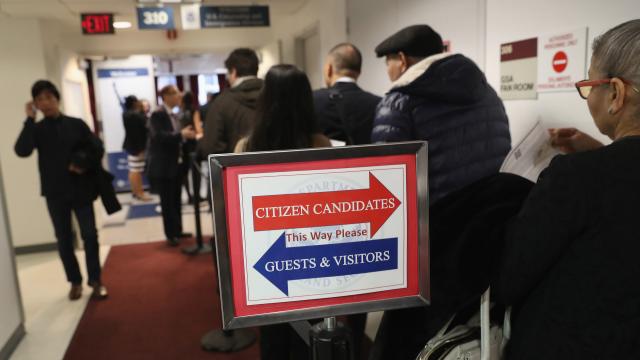If you’ve ever run a foreign language through Google Translate, you know it’s good enough to maybe get you the general gist but not the whole picture. Yet somehow, the U.S. government has decided that the service is good enough to vet the social media accounts of refugees, according to a new ProPublica report.
A U.S. Citizenship and Immigrations Services manual obtained by the International Refugee Assistance Project advises officers “the most efficient approach to translate foreign language contents is to utilise one of the many free online language translation services provided by Google, Yahoo, Bing, and other search engines.” There’s even an image providing step-by-step instructions on how to use Google Translate.
The main reason this is troubling is officers are being instructed to use these machine translation tools as a means of vetting a refugee’s social media. You know, platforms where we all speak super formally with zero slang, idioms, cultural references, or spontaneous wordplay. What officers find is then used as a factor in deciding whether to admit someone into the United States. In an example, ProPublica ran a sentence from this Urdu-language tweet through Google Translate.
They also had it translated by an Urdu professor from the University of Pennsylvania. The human translation read: “I have been spanked a lot and have also gathered a lot of love (from my parents).” Google translated it as “The beating is too big and the love is too windy.” Sure, but I’m still none the wiser as to what the original tweet means or if it presents any real security risk.
Another danger of relying solely on machine translation is it leaves monolingual officers at a loss of whether a post needs further investigation. If you speak multiple languages, then you know humour is impossibly hard to translate well, even for humans. An obvious joke in one culture may appear nonsensical without context in another.
Experts interviewed by ProPublica pointed to “low-key” or “being cancelled” as examples of English phrases that could potentially trip up machine translations, which are generally trained using formal texts. For fun, I tried using Google to translate the word “yeet” into Japanese. I got the word “mada” which means “still” — probably because yeet resembles yet.
Gadgets from smartwatches to smartphones have added machine-learning translation features and apps in recent years. However, their utility is mostly limited to simple phrases related to getting around, or translating signs. Google itself says that while “reasonable efforts have been made to provide an accurate translation… no automated translation is perfect nor is it intended to replace human translators.”
One relevant example of machine translation’s limitations is this 2018 case, where a judge ruled that Google Translate was not a sufficient means of obtaining consent for a police search.
It’s not clear when USCIS issued its manual, whether it is still in effect, or if it impacts all refugees or other types of immigrants as well. What is clear, however, is that USCIS conducted 11,740 social media screenings in fiscal year 2018, according to its own presentation.
Even more concerning is earlier this month, it was reported that the U.S. Department of Homeland Security plans to step up its social media screening policies for people entering the country.
While it was already required for nearly all visa applicants in the U.S., it will now reportedly be required for immigration benefits like naturalisation and asylum, on top of visa waivers, updates, and the U.S. Electronic System for Travel Authorisation document.
